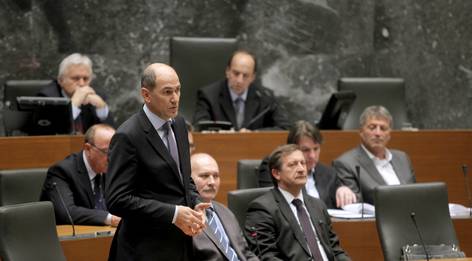NEWS
Prime Minister Janez Janša: "As regards the promises that the Government will do everything possible to get Slovenia out of the crisis, these promises have been fulfilled"
"In the case of new early elections and four months of political backlash the new economic indicators will be much worse" said the Prime Minister speaking to the members of the National Assembly today. The Prime Minister answered questions from deputies at the beginning of the 10th regular session of the National Assembly. He explained the large time difference between the confidence vote and the constructive vote of no confidence. "Confidence vote requires two weeks to form the government; in the event of a vote of no confidence, it takes at least four and a half months."
"On 25 January 25 this year, the Slovene Intelligence and Security Agency employed less people than at the beginning of the term of office of this Government. Moreover, less money was spent on salaries than the year before. Less money is also provided for this purpose in the budget for the future." explained Prime Minister Janša to Jerko Čehovin, a Positive Slovenia deputy who wanted to know when and how many new employees had been hired by the Agency between the date of appointment of the new director and the entry into force of the Fiscal Balance Act. "Everything has been legal during this Government's term of office. Who will be hired by the Agency based on job classification is decided by the competent bodies, not by the committee supervising the work of the Parliament or by the Government. The Government did not decide on this matter. However, the letters written by some of the Agency's employees 'raise concern' since they indicate that some people are subject to political scrutiny. This implies that the spirit of the former State Security Administration is still well alive. I believe that the committee should be concerned with this,” added the Prime Minister.
"As regards the promises that the Government that I lead will do everything possible to get Slovenia out of the crisis, it is true. A lot has been done so far," replied the Prime Minister to Janko Veber, a Social Democrats deputy who had expressed his belief that the Prime Minister was the most responsible for the Government's political crisis. The deputy wanted to know how the Prime Minister intended to resolve the current situation. The Prime Minister replied that he had made no promises regarding the solution of the political crisis but had presented his arguments to the Commission for the Prevention of Corruption; however, Mr Klemenčič and Mr Praprotnik obviously found none of these arguments persuasive. "The wise guys, jacks of all trades, who have, as they claim, the majority in Parliament, should submit a constructive no-confidence motion and take over the government. One half of these wise guys who call themselves the ‘clean hands’ coalition, favour early elections," the Prime Minister challenged the deputies. In his opinion, there would be no major difference despite elections without a considerable improvement in the electoral system. The Prime Minister reminded the deputy Veber that, when the latter was still a mayor, he received a negative opinion from the Court of Auditors, which is a very rare occurrence for a leftist mayor. The Social Democrats went for a vote of confidence, which took nine months before the appointment of the new government. "In the event of new early elections and a four-month political backlash, the indicators you are referring to will deteriorate much further," said Prime Minister Janša. "You have got ten signatures, submit them," the Prime Minister once again called on the opposition to submit a constructive no-confidence motion guaranteed by the Constitution of the Republic of Slovenia.
"In the regulated part of the economy, i.e. in state-owned enterprises which are governed by the laws adopted during previous Government's term of office, regulation is not appropriate. The solution is to make a part of the salary variable and dependent on the performance of these enterprises. Today we are witnessing companies that suffer losses but still pay high salaries. And there are cases where salaries are low and corporate results are good. I hope that the Slovenian Sovereign Holding will become operational as soon as possible and that internal rules which also include remuneration will be adopted. Moreover, that these rules will also regulate the variable part of the salary as well as the average salary in general," replied the Prime Minister to Ivan Hršak, a deputy of the Democratic Party of Pensioners of Slovenia who inquired what the Government planned to do about salary anomalies and when. The deputy Hršak also wanted to know whether it was true that NLB employees received the Christmas bonus at the end of December despite the utterly catastrophic situation in this bank. The Prime Minister replied that, according to the information received from the Ministry of Finance, no Christmas bonus had been paid by NLB last year.





